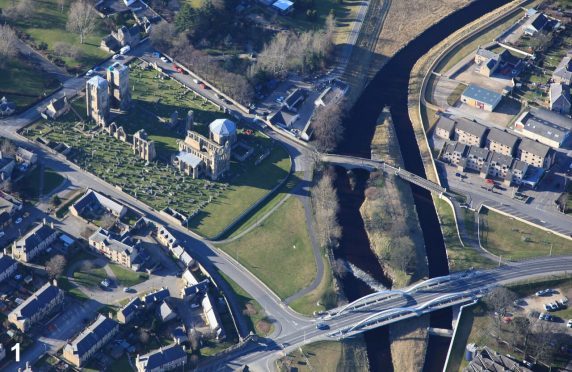An engineering feat, which protects thousands of Moray residents from the threat of flooding, has been celebrated on the national stage.
The £86million Elgin flood alleviation scheme was constructed in response to decades of devastation in the town.
Residents, who previously stockpiled sandbags when heavy rainfall struck the region, are now able to relax, in the knowledge the town’s new defence scheme will safeguard their properties from rising waters.
And the project has been commended at the 2016 Saltire Civil Engineering Awards – where judges hailed it as “environmentally and visually pleasing”.
It took four years to complete the massive undertaking along a stretch of the River Lossie through Elgin.
Engineers removed constrictions along the expanse to increase flood capacity, and it is estimated 750 residential and 250 business properties along the riverbank have been protected.
The programme also yielded fringe benefits such as the creation of a new cycle path heading east out of Elgin.
Engineering judges hailed the scheme as “a well thought-through project, providing a modern and pleasant civil engineering solution which is environmentally and visually pleasing, and well finished”.
Flooding problems in Elgin date back 250 years, with the most recent severe incidents happening in 1997, 2000, 2002 and 2009.
In 2002, more than 200 households were evacuated and 10 people airlifted to safety.
Construction on the protection project started in April 2011, following a decade of planning, and it completed last August.
The local authority’s former flooding guru, Dave Gowans, was one of the driving forces behind the initiative.
He said: “The focus was always to reduce flood risk to our communities, as quickly and sustainably as we could, and Elgin was our trickiest scheme.”
Mr Gowans has since left the council to work on plans to dual the A96 Aberdeen to Inverness road through the region.
During a meeting of the authority’s policy and resources committee yesterday, members learned that initial projections surrounding the cost of the project had been ill-judged.
When work completed last summer, the authority claimed that it had cost about £3million less than expected.
But, since then, more than 600 compensatory costs have been tallied, and the savings figure has been revised as £1million.
